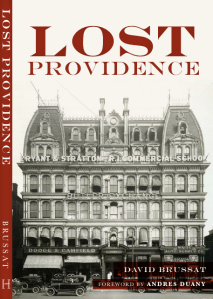Victoria and I attended last night’s Rhode Island Philharmonic Orchestra performance at Veterans Memorial Auditorium. It was a wonderful concert even though – perhaps because – we left during intermission. Not that we wanted to miss Stravinsky’s “Rite of Spring,” but it is not among my favorites, and its placement at the conclusion of the program gave us our “out” to exit early, which would have been inconceivable had Tchaikovsky’s Piano Concerto No. 1 been the last piece of the evening.
Inarguably, however, “Rite” is the more famous and influential piece. But last night’s solo in the concerto by guest pianist Lilya Zilberstein outshined all the notes of the “Rite” combined, unless the audience gave two standing ovations that evening. It’s a good thing the concerto had spots where Zilberstein could give her extraordinary fingers a rest!
It is common knowledge that music directors place modernist works early or in the middle of the program, saving the best for last so that people will not leave at intermission. This practice has been maintained for two decades by Larry Rachleff, whom I worship. I would worship him even more if he excluded all atonal works from the classical series every year, and I have little doubt that subscriptions would skyrocket.
Stravinsky is not exclusively atonal but his work, toward the beginning of the 20th century, pushed the modernist tendency to “challenge” audiences famous for (and both now and then often denounced for) preferring to spend an evening with beautiful music in whose pleasure they could steep themselves.
The program notes by Michael Fink are illuminating. He describes the 1913 premiere of the “Rite” as decidedly uncomfortable. “The intellectual and artistic world of Paris may have been ready for such a shocking theme [sacrifice of a young girl to the god of spring]. … The wealthy patrons, however, and more traditional-minded ballet goers definitely were not. They apparently took the work as a personal insult.” Stravinsky himself wrote in his autobiography:
As for the actual performance, I am not in a position to judge as I left the auditorium at the first bars of the prelude, which had at once evoked derisive laughter. I was disgusted. These demonstrations, at first isolated, soon became general, provoking counter-demonstrations and very quickly developing into a terrific uproar. … I had to hold [the choreographer] Nijinsky by his clothes, for he was furious and ready to dash on to the stage at any moment and create a scandal. Diaghilev [impresario of the Ballets Russes] kept ordering the electricians to turn the lights on and off, hoping in that way to put a stop to the noise.
One can’t imagine such audience behavior these days, not necessarily because classical concert audiences have less musical judgment or lower standards today. They have more manners, but perhaps also less confidence in their convictions regarding music. At most, some in the Vets audience last night were probably rolling their eyes and having little dialogues in their heads about what music should be. But maybe audiences really do not lack that confidence – maybe it is expressed not in shouting down the music they dislike from the pits but in lower rates of subscription to the classical series.
Victoria and I listened to the Stravinsky on YouTube in bed later and agreed that, although certainly the orchestra would have performed it exceedingly well, having “The Rite of Spring” at the end certainly made it easier for us to leave in the middle.
Rachleff is a genius who has in 20 years raised the quality of Rhode Island’s philharmonic to the highest level. Victoria and I are not happy that he will be leaving soon.
But the board of the Phil should consider replacing him with a music director who will have the courage of the audience’s convictions, expressed by inflicting fewer modernist “masterpieces” on concertgoers. Such a director would have to fend off accusations of pandering to the public, but a truly courageous director would do just that, and rather than being defensive about it, defend it with brio.
Atonal is to classical music what modernism is to architecture – a bummer masquerading as a stroke of genius. Young composers coming up are realizing this, and many are putting atonal music behind them. Eventually, the trend will trickle up to the board membership and artistic directorships of orchestras. Meanwhile, however, the Philharmonic’s next music director’s most important job will be to ensure that the orchestra’s excellence is maintained, whatever the music the musicians play.






I hope there will always be a place for concert halls just as there should always be a place for opera houses. I just find it very difficult to imagine anyone coming up with new works for performing in those places that people will want to pay to listen to. Radio should step in to allow new composers to air their works and I would enjoy listening but unfortunately radio has be dumbed down to prevent that happening.
LikeLike
Interesting piece. I enjoy classical music on the radio, at least, I would, except all the old radio stations that were serious about it have become general enlighteners about the great world of music with endless chat thrown in. What you want which is full symphonies and operas, and, yes, avant garde is good, with all the hiccups and coughing between movements broadcast live. As for going to a concert, I would be missing the action of the film – for that is where classical music has its true home today – in the movies. The music for Avatar in my humble opinion is a full development of the orchestral possibilities and is true to the format. And it stands up alone. Once classical composers try to compose for concerts they get entangled in a duty to be avant-garde and ignore their audience. All the best stuff has already been written. An art for needs to develop but I really don’t see classical music for concerts going anywhere. So stick to Tchaikovsky if you can enjoy it. But you are witness to a dead end cultural form. As I think your piece makes clear
LikeLike
I fall in with you on most of your sentiments. I am not against all avant grade classical music, just most of it, as is the case with me for modern architecture. Most of it. By far. I split with you on the future of classical music. Note my remarks about young composers pushing back against atonal. I think, however, that you are right about film music, and that may be where young composers are seeing the writing on the wall and where they may make their mark – though I think there will always be room for a mixture of new classical music at places like Vets.
LikeLike